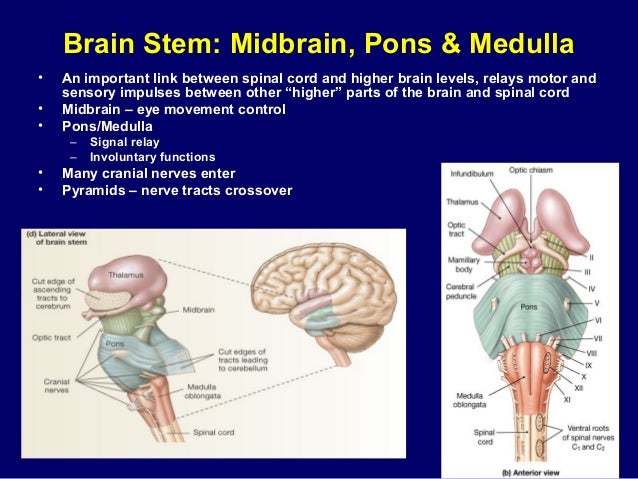

The thalamus acts as a relay for information from the senses to the cerebral cortex (the covering of the brain that interprets and processes information from short- to long-term memory).

The brain stem (especially the pons and medulla) also plays a special role in REM sleep it sends signals to relax muscles essential for body posture and limb movements, so that we don’t act out our dreams. (The brain stem includes structures called the pons, medulla, and midbrain.) Sleep-promoting cells within the hypothalamus and the brain stem produce a brain chemical called GABA, which acts to reduce the activity of arousal centers in the hypothalamus and the brain stem. The brain stem, at the base of the brain, communicates with the hypothalamus to control the transitions between wake and sleep. Most blind people maintain some ability to sense light and are able to modify their sleep/wake cycle. Some people with damage to the SCN sleep erratically throughout the day because they are not able to match their circadian rhythms with the light-dark cycle. Within the hypothalamus is the suprachiasmatic nucleus (SCN) – clusters of thousands of cells that receive information about light exposure directly from the eyes and control your behavioral rhythm. The hypothalamus, a peanut-sized structure deep inside the brain, contains groups of nerve cells that act as control centers affecting sleep and arousal. Several structures within the brain are involved with sleep. This booklet describes how your need for sleep is regulated and what happens in the brain during sleep. Sleep is a complex and dynamic process that affects how you function in ways scientists are now beginning to understand. Research shows that a chronic lack of sleep, or getting poor quality sleep, increases the risk of disorders including high blood pressure, cardiovascular disease, diabetes, depression, and obesity. Sleep affects almost every type of tissue and system in the body – from the brain, heart, and lungs to metabolism, immune function, mood, and disease resistance. Recent findings suggest that sleep plays a housekeeping role that removes toxins in your brain that build up while you are awake.Įveryone needs sleep, but its biological purpose remains a mystery. In fact, your brain and body stay remarkably active while you sleep. Sleep is important to a number of brain functions, including how nerve cells (neurons) communicate with each other. Without sleep you can’t form or maintain the pathways in your brain that let you learn and create new memories, and it’s harder to concentrate and respond quickly. Quality sleep – and getting enough of it at the right times - is as essential to survival as food and water. Sleep is an important part of your daily routine-you spend about one-third of your time doing it.


 0 kommentar(er)
0 kommentar(er)
